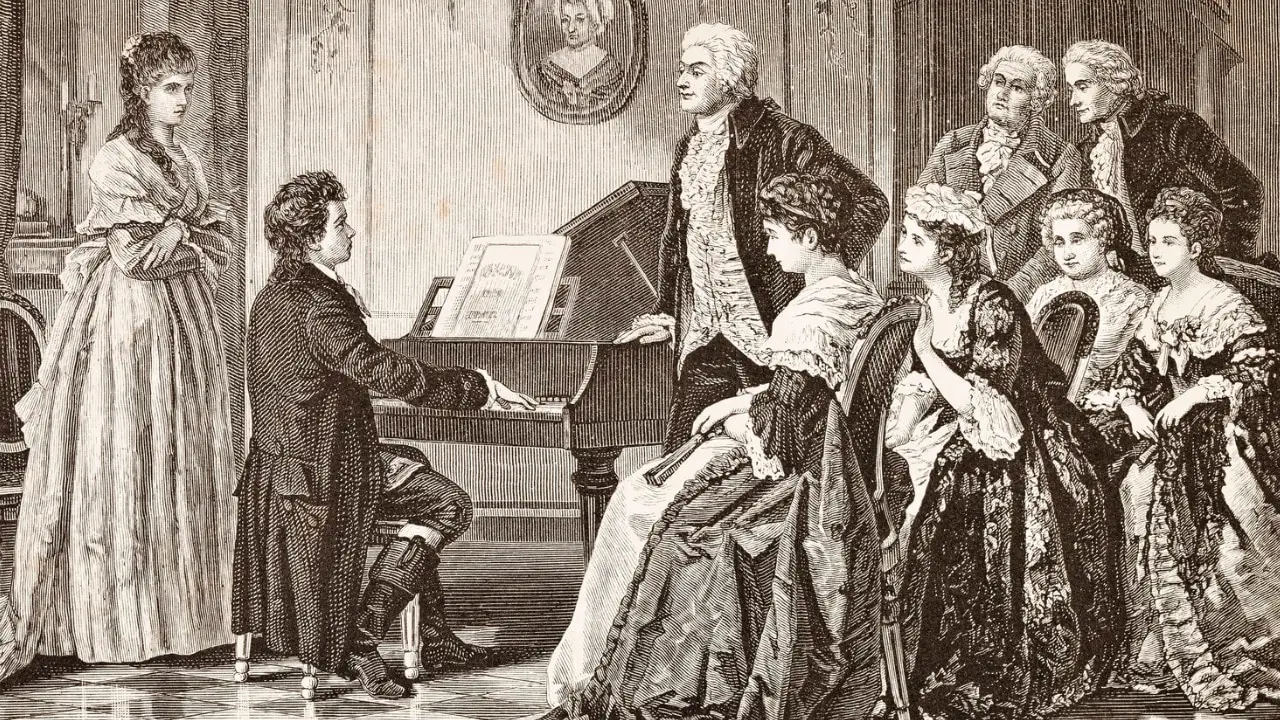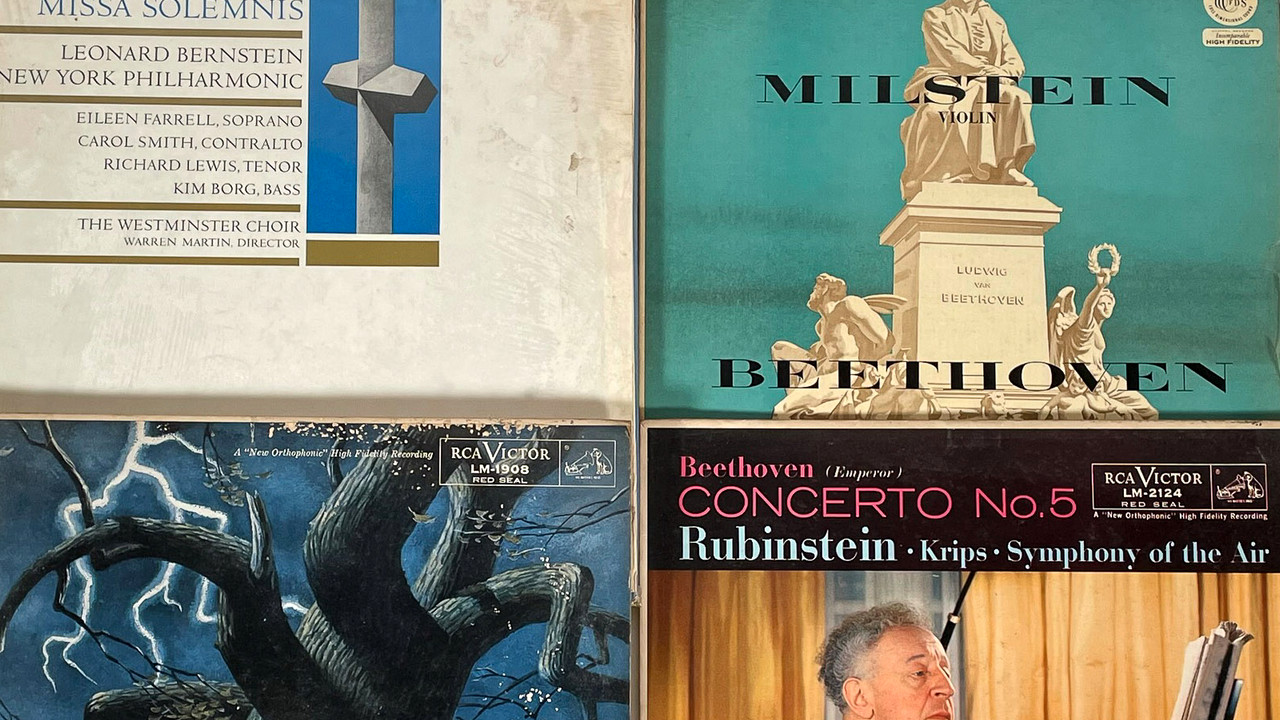So you've got a new love in your life, and this person is interested in classical music. Are you into it? Yeah, I can get a lot of homework done with this on-style? Or for real? You should at least make an effort, right?
There is a gulf of compromise between a full on study of a vast and complex field -- and not even making an effort. And right in the middle of it is this handy cheat sheet covering all the basic and presenting a wealth of youtubes to click.

Let's start with the X-Man of classical music:
Bach
Johann Sebastian Bach (1685 – 1750) is considered the OG music genius of all time for a lot of reasons. His catalog is almost endless -- 1126 compositions if you wanna be technical about it. Organ music was his specialty, but he also has a whole wack of pieces for the recently-invented tuning for harpsichord.
His best jams have this mood about them that's not happy or sad, heavy or light… they're just deep, and tragically hopeful.
Bach was a hardcore religious dude who infused all his pieces with the pagan Christian numerological symbolism that was de rigeur in his time, and eventually got so good that he could compose without a keyboard or anything.
He wrote lots of fugues. A fugue is a piece where you hear a kind of boring theme played, and as it's humming along the tune starts again higher or lower, and they weave together, and then the tune starts again in another voice while the others continue, and pretty soon you've got a musical Mandelbrot fractal twisting and weaving on itself like strands of DNA during abiogenesis or something, real psychedelia.
Mozart
Next comes Wolfgang Amadeus Mozart (1756 – 1791). Mozart takes this whole froofy powdered wigs, buckled shoes thing and makes it sing. He was to classical music like what Miles Davis was to jazz. The emotion comes close to, but never quite becomes cynical, cloying, weepy or melodramatic.
I guess Hollywood says he was the kind of personality who would piss most of us off or whatever but he totally kills it with the music thing.
He died when he was 35 and a few composers who knew he was the breasts came out to his funeral but otherwise people stayed home. Not cause they didn't care but because that was what you did back then.
His older sister Nannerl was also reportedly a top-notch jammer until she had to quit 'cause it was time to get married.
Beethoven
Then Ludwig van Beethoven (1770 – 1827) came along and made Mozart sound froofy.
Beethoven was Sabbath to Mozart's Beach Boys. You get some of those weird emotions that Mozart didn't really jam on; things get grim; they get attitude; they get way overblown. He does this trick of writing the music to make it sound like the pianist is taking a couple practice swings at the jam before it breaks out.
He does all this while he is slowly going deaf.
Beethoven's solo piano music is badass and makes ladies faint cause it's so emo; the piano is becoming this popular instrument for people who aren't like nobility or whatever, so the masses can take Beethoven home and dig on it. Later composers analyzed his work and said he wasn't that good at harmony, melody, orchestration, or counterpoint.
Like Sabbath, it wasn't really about skill, it was the vibe that was different and new, and everyone couldn't get enough. His funeral was attended by 20,000 people.
Chopin + Mahler
Frédéric Chopin (1810 – 1849): imagine ultra-gushy Polish house music, piano solo, folk dances but made appealing to rich people. He used to spend days on one bar of music, trying to get a sequence of three or four chords just right. Strangely for such a romantic, he never married and had an affair for ten years with a woman named George Sand who had lots of other affairs. Just another one married to the music, I guess.
Gustav Mahler (1860 – 1911) is this weirdo who composes symphonies by taking great German folk songs, deconstructing them and playing them really slowly. He's like the DJ Screw or Khanate type, it's mostly overdone, but he does do some wild industrial-sounding orchestration occasionally, and some of those tunes totally deserve to be played back at weed speed.
The Russians
The modern Russians were a handful of guys with beards and catchy riffs, with Pyotr Ilyich Tchaikovsky (1840 – 1893) being the catalyst as just the catchiest tunesmith of all time. Think Nutcracker, Swan Lake, Sleeping Beauty… you walk out of the place not with the one loudest jam in your head, but you're whistling through several tunes to find the one you liked the most which you can't remember, cause all the other tunes were so damn catchy, too.
Borodin (1833 – 1887), Gliere (1875 – 1874] – 23 June 1956), and others were two- or three-hit wonders. Rimsky-Korsakov had some exceptionally slammin pie
The icing on the modern Russian cake, Igor Stravinsky (1882 – 1971), is considered by many to be the composer with the highest levels of ninjantium in his blood cells since Bach. He's better than most at most things. An uneven career, but his ballets are indispensable
The British invasion
Gustav Holst (1874 – 1934) and Edward Elgar (1857 – 1934) were the British invasion of classical. They brought that stoic, British Empire sound like it's so great being the best. Holst's The Planets is the quintessential orchestral one-hit-wonder, but some of the dissonances and edgy chords were even busted simultaneously by Stravinsky, so you know it's good:
Later the Planets vibe was ripped off by Star Wars, Back to the Future, etc.
America
Aaron Copland (1900 – 1990) is considered the inventor of the American sound in classical music. His two cowboy ballets, and his Fanfare for the Common Man are as American a concept as it gets.
While others got their exotic inspiration from Arabia and the Orient, Copland wrote pieces about Cuba and Mexico. His harmonic language can make for some really bananas endings, and sometimes the jam sounds like an out of tune saloon piano on purpose. He wrote a piece called Lincoln Portrait which has narration about Lincoln's life and it's actually good.
Charles Ives (1874 – 1954) is the another semi-classical American composer, and he put out some weird stuff. Conlon Nancarrow (1912 – 1997) wrote music for player pianos using a ruler and holepunch and wasn't known until the 1980s because of his living in isolation, so he doesn't fit anywhere but deserves a mention.
Shit got really weird
By the 1950s classical music was really split with some new heads getting weirder and weir
There are some new promising composers bridging the gap. Time will tell how this stuff holds up.
A lot of classical music composers didn't make it to this list. This is the stuff I like and know, and you should be able to get your head wrapped around what you in particular enjoy starting with these basics.
 |
 Ape Out Shirt $21.68 |
 |

